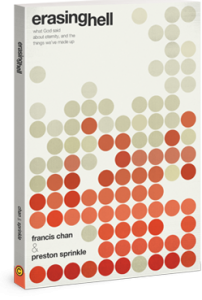Francis Chan is a pastor, international speaker, and best-selling author. He founded Cornerstone Church in 1994 and served as its lead pastor until stepping down to focus on his writing and speaking. Chan currently serves at Cornerstone as a non-staff elder. In 2004, he launched Eternity Bible College. Chan is the author of several books including Crazy Love: Overwhelmed by a Relentless God (2008); Forgotten God: Reversing Our Tragic Neglect of the Holy Spirit (2009); and, with Preston Sprinkle, Erasing Hell: What God Said About Eternity, and the Things We’ve Made Up (2011).
Preston Sprinkle is an associate professor of Biblical studies at Eternity Bible College. He earned his Ph.D. in New Testament at the University of Aberdeen and previously taught in the department of Biblical Studies at Cedarville University. He is the author of Law and Life: The Interpretation of Leviticus 18:15 in Early Judaism and in Paul (2008) and the co-author of two books: The Faith of Jesus Christ: Exegetical, Theological and Biblical Studies (2010 with Michael F. Bird) and Erasing Hell: What God Said About Eternity, and the Things We’ve Made Up (2011 with Francis Chan). Sprinkle’s next book, Paul and Judaism Revisited, will be published in 2012.
Book Basics
Erasing Hell offers a traditional evangelical Christian approach to hell in response to Rob Bell’s recent book, Love Wins: A Book About Heaven, Hell and the Fate of Every Person Who Ever Lived (2011), which provides evangelicals with an alternative understanding that has been more typically associated with the mainline in recent years. While the book is technically co-authored it is written in Chan’s voice and Sprinkle is the primary researcher. Since Chan lacks any true academic credentials (his highest earned degree is a Master of Divinity from the Master’s Seminary), this arrangement allows him to speak with greater authority about the topic and especially the numerous biblical passages used to support their position.
The text is logically ordered beginning with the general topic of hell, including current discussions, then proceeding with what Jesus and the early followers of Jesus said about hell before concluding with application of what this means today. Additionally, it provides an appendix of Frequently Asked Questions.
The book argues that hell is a very real place and ends with a question designed to elicit the reader’s introspective response about her or his own eternal destiny: Are you sure that you have embraced the God who can save you from hell? (p.148)
While the book is very readable, Chan’s reassuring pastoral tone borders on condescending at times. This however is tempered a bit by his multiple remarks about how much he learned during the process of researching and writing the text.
So What?
For people of faith, the answer to questions about what happens when this life ends are found in religious texts and traditions. For Christians, the Bible must be included when formulating an understanding to these questions.
- Do you believe Christians have largely focused too much on life beyond this life (eternal life) to the detriment of what the life of faith should look like in this life? Why or why not?
- What is your view of heaven and hell? How has it changed over time? What sources have been most influential in the formation of your perspective?
Francis Chan and Preston Sprinkle. Erasing Hell: What God Said About Eternity, and the Things We’ve Made Up. (David C. Cook, 2011). ISBN: 9780781407250.
